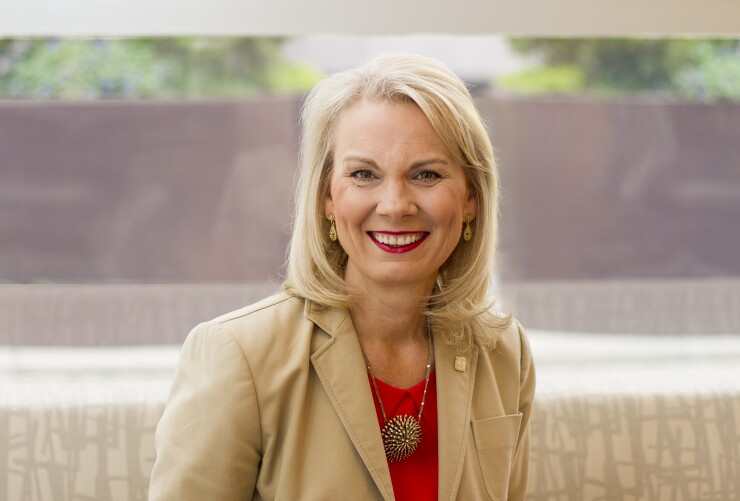Want unlimited access to top ideas and insights?
Katie Ockerman has been with Fifth Third Bancorp for 10 years. It’s the only career she’s known, but when she was preparing for the arrival of her twin daughters last summer, she was concerned about balancing the demands of motherhood and her job.
That’s where the Cincinnati bank’s new maternity concierge program came in.
It launched in January and already more than 170 women have taken advantage of it, said Teresa Tanner, Fifth Third’s chief administrative officer. The program is akin to a personal assistant who can handle any task a new mom might find overwhelming, from finding a pediatrician to planning a child’s birthday party to grocery shopping. Though the $140 billion-asset bank already had a maternity leave policy, it was not enough to keep some women from dropping out, even if they might have preferred to keep working.
“We’re not making the progress of keeping women in the workforce and pulling them to senior ranks,” Tanner said. “We’ve had all these programs around for decades now, but we’re not getting results. We’ve got to step back and say, what are we missing?”
Ockerman, a branch manager, said it was helpful to have someone she could call on for things like meal prep, party planning or finding child-friendly activities and venues in her neighborhood.

“When you become a mom you have all these concerns about, can I do both? This made me feel like they supported their employees, they understand, and they gave us something to lean on,” she said. “That just makes my drive for this company even higher. I want to work for them if they’re supporting me. It made a big difference.”
According to Julie Nugent, vice president and center leader at the nonprofit Catalyst Research Center for Corporate Practice, the maternity concierge program is unique to Fifth Third. She doesn’t know of many other programs quite like it, although forward-thinking companies are making greater efforts to include men in their parental leave policies and to help new moms transition back into the workforce after the birth of a child.
“When you’re getting ready to come back to work, that is often the most stressful time of all,” she said. “You have a new baby and a lot of responsibilities at home. When you’re at work, you might need a little more flexibility, and you certainly want to get back up to speed as quickly as possible.”

Fifth Third already offers six paid weeks of medical leave for new mothers and will add another four fully paid weeks to that beginning in August. Its family leave policy also gives men four weeks of paid leave for the birth, adoption or fostering of a child. But women who had recently completed maternity leave still left the bank at twice the rate of all other women employees. Women make up 60% of Fifth Third’s total workforce — but just 23% of its senior managers and executives.
Maternity leave alone clearly was not cutting it, so Tanner turned to the mothers at Fifth Third for some insight. She started with a simple enough question: “What’s hard?”
As the moms of Fifth Third listed off the various responsibilities associated with a new child, Tanner realized the bank could build in a better support infrastructure for them by simply taking some of those tasks off their to-do lists. The bank was already working with Best Upon Request to offer its Cincinnati-area employees general concierge services, like grocery shopping and vacation planning, so she approached them about building out a service for young moms.
The outside firm has embedded two full-time employees inside Fifth Third’s headquarters to field calls, emails and online-chat queries from — or, in some cases, meet face to face with — moms of newborns and kids up to a year old. Fifth Third declined to say how much the service costs, but a company spokeswoman said it amounts to a “six-figure investment.”
Nugent described other programs she’s seen at corporations trying to do more for new parents. Some companies connect new parents with more experienced parents in mentoring and networking programs. Others offer webinars and coaching on topics like breastfeeding.
Nugent said it all reflects a broader shift in awareness that maternity leave alone won’t help keep women in the workforce after having children.
“There’s a clear business imperative here for many reasons,” she said. “Largely, what company really wants to limit 50% of its workforce talent? Women are a critical talent pool, and women are also the ones who have babies. Smart companies need to have programs in place that support mothers.”
Tanner said she would advise other banks to listen to their employees. Ask them what the barriers are to staying in the workforce after the birth of a child and how the company can better support new mothers, she said.
“We’re never going to be the best bank we can be unless we have diversity at all levels of the company,” she said. “If we want diversity at the most senior level of the company — and we do — we have to figure out how to keep women and allow them to grow their careers.”





